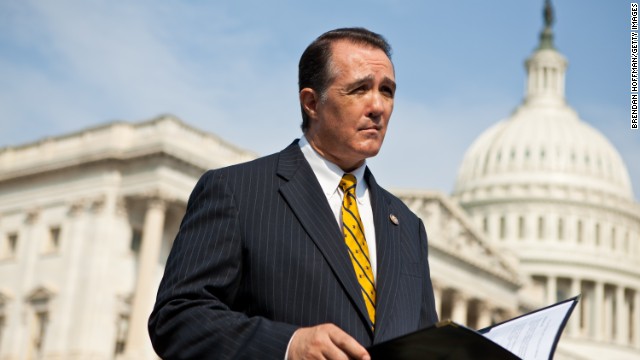- Back to Home »
- Abortion bill sponsor said what?

- Judiciary Republicans sought anti-abortion bill with no exception for rape, incest
- Judiciary chair Trent Franks: "Incidents of rape resulting in pregnancy are very low"
- Donna Brazile: His remark tells women who got pregnant by rape they don't count
- Brazile: House GOP finally added exception to the bill to avoid embarrassing defeat
Editor's note: Donna Brazile, a CNN contributor and a Democratic strategist, is vice chairwoman for voter registration and participation at the Democratic National Committee. She is a nationally syndicated columnist, an adjunct professor at Georgetown University and author of "Cooking with Grease: Stirring the Pot in America." She was manager for the Gore-Lieberman presidential campaign in 2000.
(CNN) -- "The stupidity is simply staggering," Rep. Charlie Dent, a moderate Republican from Pennsylvania, told Roll Call. He was referring to the political miscalculation of anti-abortion forces in the House Judiciary Committee who insisted this week on reviving the culture wars, years behind us, still again, with yet another proposed abortion bill.
This bill, championed by Arizona Republican Rep. Trent Franks, sought to ban abortions after 20 weeks nationwide, with no exceptions for victims of rape or incest. "I'll be very frank: I discouraged our leadership from bringing this to a vote on the floor," Dent said.
My e-mail box was flooded with headlines that began "This again?" and "This ... is the GOP's idea of outreach to women? Really?" and "He said what?" The latter referred to a remark by Franks, chairman of the committee, that "incidents of rape resulting in pregnancy are very low," as a justification for the bill ignoring rape and incest victims.

Democrats on the Judiciary Committee were apparently willing to allow the time when an abortion is legal to be reduced by one month. They sought to add exceptions for rape, incest and the woman's health -- all of which were rejected by Republicans on the panel.
But it appears the House Republican leaders, recognizing a train wreck, added the language to the bill anyway to avoid an embarrassing defeat. The bill will also include an exception for a medical emergency in which the woman might die. This new altered version goes before the Rules Committee on Monday. There are, by the way, 22 Republicans on the Judiciary Committee. All men. Not a single woman.
It's hard to avoid inflammatory remarks when discussing rape. And the line between inflammatory and insulting is thin. It's also porous. So if Franks thought he had to address the issue of rape, he should have done so judiciously.
His remark says to women impregnated by rape: You don't count. There aren't enough of you to matter. That's not just insensitive; it's immoral.
Rep. Zoe Lofgren, D-California, first pounced on the statement's factual inaccuracy. "I just find it astonishing to hear a phrase repeated that the incidence of pregnancy from rape is low," she said. "There's no scientific basis for that."
Then Lofgren, one of five women among the Democratic minority on the committee, added, "And the idea that the Republican men on this committee can tell the women of America that they have to carry to term the product of a rape is outrageous."
It might be that Franks' argument, such as it is, echoed a comment by Missouri Republican Rep. Todd Aiken, who claimed during his Senate campaign last fall that women's bodies have a built-in mechanism to prevent impregnation from "a legitimate rape." Aiken's candidacy went into a tailspin from that misinformed remark, and never recovered.
Fact checkers have pointed to studies that indicate Franks' claim is as suspect as Aiken's. One study by St. Lawrence University found that pregnancies resulting from rape were higher than from other instances.
Franks later walked back his low-pregnancy-from-rape argument, saying he was not claiming it was harder to get pregnant from rape. Franks apparently based his claim on there being fewer pregnancies from rape than from consensual intercourse. Even so, that's a "Duh, do the math" excuse.
GOP aides now say Rep. Marsha Blackburn will be managing Franks' anti-abortion bill. Given her record -- "no" votes on major equality or women-protection legislation and "yea" for issues like ending federal funding for Planned Parenthood -- that's hardly an improvement.
And it misses the point. It's not the who, it's the what -- the argument itself does not stand.
During the Judiciary debate, Franks said, "When you make that exception, there's usually a requirement to report the rape within 48 hours. And in this case that's impossible. ... And that's what completely negates and vitiates the purpose for such an amendment."
So, Franks' argument then became a technical one, that if a rape wasn't reported, a decision after 20 weeks to abort was made too late. But why is it too late? Does psychological trauma have a timetable? Each case of rape that produces a pregnancy is as individual as the woman who was raped. And the ordeal -- psychological, emotional, physical, spiritual -- is not term-limited.
The issue of abortion raises real and poignant moral questions. Franks made many remarks that show his obvious, deeply felt, conviction that abortions after 20 weeks are wrong.
But majorities in Congress and of Americans, also with deep conviction, came to a different conclusion: They feel compelled to support exceptions for rape, incest and health.
Franks' outrageous comment and the viewpoints of other Republicans on the Judiciary Committee illustrate that when one party becomes so narrowly composed that it represents a particular religious culture, we're headed to what people in other countries face when a ruling party begins making laws from religious theology, without regard to a democratic, secular society -- thus excluding other religious viewpoints and dismissing those who suffer as too few to matter.
Follow us on Twitter @CNNOpinion.
Join us on Facebook/CNNOpinion.
The opinions expressed in this commentary are solely those of Donna Brazile.







